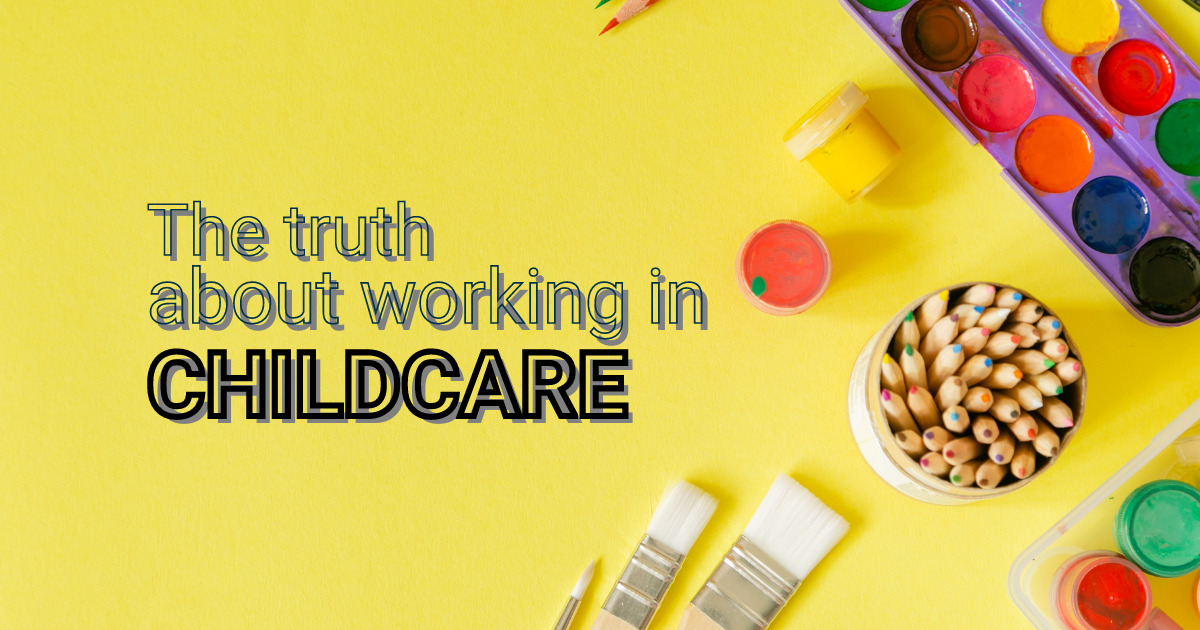
What Does The Future of Working in Childcare Look Like?
A Child Care worker is one of the most underrated, but most essential jobs in Australia. The early years of a child’s life are the most important as they start to develop their motor, sensory and social skills, as well as learning about their surroundings.
Becoming a Child Care worker also has so much room to grow, there are many different course and career paths that can help you grow in this industry!
If you are looking to work in the Child Care sector, then you will need to know about the future of this industry.
Here are 5 emerging trends in Early Childhood Education:
1. TECHNOLOGY IS BEING INTEGRATED INTO THE LEARNING ENVIRONMENT
Child Care workers and Educators cannot afford to ignore the benefits of technology in early learning. There is specialised childcare software that reduces time and costs for some mandatory reporting requirements.
Technological advancements in this sector have created a way to improve learning for children, such as learning games and way to connect families with their teachers.
2. ASSESSMENTS AND REPORTING WILL BE CONDUCTED MORE
Testing in primary and secondary schools has been used to assess the performance of teachers and students for years. These methods will provide guidance and recommendations to the educators and families of the children on how to support their children to grow. Additionally, these tests could potentially allow early intervention to address areas of concern or gifted students to receive attention to reach their full potential.
3. PHYSICAL FITNESS AND EXERCISE IS IMPORTANT
The fight against childhood obesity is important and teachers are receiving encouragement to allow plenty of time outdoors doing different activities. Childcare and pre-schools are training students in sports such as running, swimming, dancing, and even some very light martial arts training. With a big focus on non-competitive sports, organised training sessions during recess and lunches are intended to be created.
4. MORE FUNDING WITHIN THE SECTOR
The Child Care subsidy is generally paid directly to service providers who then pass it to families as a fee reduction. The chart below shows what you are eligible to receive as part of the Government subsidy.
Standard Child Care Subsidy Rates
| Your family income | Child Care Subsidy percentage |
|---|---|
| $0 to $80,000 | 90% |
| More than $80,000 to below $530,000 | Between 90% and 0% The percentage goes down by 1% for every $5,000 of income your family earns above $80,000 |
| $530,000 or more | 0% |
CCS rates for higher rate children
If your family has more than one child aged 5 or younger in care, you may get a higher Child Care Subsidy (CCS) for one or more of your children.
You can get a higher subsidy for one or more of your children if all of these apply:
- you get or will be eligible for CCS
- your family’s combined income is under $362,408
- your family has more than one CCS-eligible child aged 5, or younger.
If your family has more than one child aged 5 or under we’ll assess which children get a higher subsidy by working out both:
- the ‘standard rate child’
- the ‘higher rate child’ or the ‘higher rate children’.
The ‘standard rate child’ is usually your eldest CCS-eligible child aged 5 or under. This child will get the standard CCS percentage.
| Your family income | Child Care Subsidy percentage |
|---|---|
| $0 to $138,118 | 95% |
| More than $138,118 to below $183,118 | Between 95% and 80%
The percentage goes down by 1% for every $3,000 of income your family earns |
| $183,118 to below $262,408 | 80% |
| $262,408 to below $352,408 | Between 50% and 20% *The percentage goes down by 1% for every $3,000 of income your family earns |
| $352,408 to below $362,408 | 50% |
| $362,408 or more | Higher CCS rates no longer apply, all children in the family will get the standard CCS rate |
Source: Services Australia
5. JOB GROWTH IN 5 YEARS IS SET TO RISE
There were 106,800 Child Care Workers in 2009 and it soared to 152,200 in 2019. Now there are expected to be 182,300 in 2024! There is a very strong career growth for this industry.
The Australian government also estimated that 30,100 jobs would open up over the next five years! Likely due to Australia’s growing population and an increasing demand for mothers to return to work prior to their 12-month leave.
The top 4 states that hold the highest employment share are NSW, VIC, QLD, and SA.
Q: IS A CAREER IN CHILD CARE RIGHT FOR ME?
Before pursuing a career in Childcare, it is important to ask yourself whether yourself some questions:
- Are you patient and flexible?
- Do you love everything about kids?
- Do you want to pursue education further?
- Are you dependable?
- Is salary the only thing driving you towards picking your career?
- Are you after something rewarding?
If you answered YES to more than a few of these questions, then a career in Childcare is ideal for you!
A Childcare worker will be flexible, have a good level of fitness, passion for working with children and have plenty of energy and enthusiasm throughout the day.
At Kirana Colleges we know that your study needs to be flexible enough to work into a variety of lifestyles. That’s why we offer a variety of different study solutions so that you can have your study, your way. There are a range of online childcare courses with flexible learning options to suit your needs. Both Certificate III and IV qualifications in child care can be taken online or in class.
The flexibility of online childcare courses means they are increasing in popularity all the time. Find out more about Flexible learning options to suit your needs. Whether you are looking to start a career in child care or upskill, we have a child care course for you. For more information on our nationally recognised child care courses online, contact us.
Q: WHERE CAN A CAREER IN CHILD CARE LEAD ME?
A career in childcare does not mean you will be an Educator and that is it. There are plenty of career pathways when you study for a Diploma in Early Childhood Education and Care.
You could become a:
- Early Childhood Trainer
- Day Care worker
- After School Care
- Home Day Care
- Early Childhood Teacher
- Education Aide
Around half of the employees in child care work full time (47%), which means there are a lot of opportunities for people who are either looking for a full-time or part-time role.
The largest age group employed in the childcare sector is 25-34 (26.7%) with many workers below the age of 25. This is a female predominant industry with 95% of the female workforce.
There are many study options available to aspiring childcare workers. Explore one of our nationally recognised childcare courses.
You can find more information about becoming a child care worker and available child care courses in this video:
Speak to one of our Course and Career’s Advisors
if you have any further questions!
Pick a time: lunchtime, after the kids are in bed, anytime. We’ll call you back.




